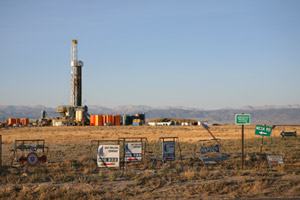Report for Obama Questions Effectiveness of Gas Drilling Regulations
An Energy Department panel said there are serious environmental consequences of drilling for gas in deep shale formations. Without action, the panel said, those problems will worsen.

(Abrahm Lustgarten/ProPublica)
In sharp contrast with gas industry portrayals, the draft report released yesterday by a federal panel on shale gas drilling explicitly acknowledges that current regulations may be insufficient to protect the environment and public health.
For years, the gas industry has said that drilling with hydraulic fracturing, or fracking, into deep shale formations is safe. The federal government has been caught in an awkward position, limited from regulating the industry by exemptions written into federal environmental laws, while also working to promote domestic energy production.
The draft report continues to promote drilling, but it comes down squarely on the side of stronger oversight. It notes serious environmental impacts from shale gas drilling and says it is "far from clear" whether federal and state regulations are protecting the public.
"If effective environmental action is not taken today," the report says, "the potential environmental consequences will grow to a point that the country will be faced (with) a more serious problem."
Many of the panel's recommendations already have been adopted by some states and members of the drilling industry over the last couple of years, including disclosure of chemicals used in fracking and better well construction.
Some go further. The report recommends that companies monitor air quality on drilling sites and publish those results. It also calls for limits on emissions of methane, a potent greenhouse gas and the primary component of natural gas.
"I think we're lifting the bar a bit," said John Deutch, chairman of the panel. Deutch is a former CIA director, has worked for the Energy Department and also sits on the board of two energy companies.
Across the board, the panel recommended making more information available to the public in order to create transparency and give a sense that progress is being made, Deutch said.
President Obama commissioned the report in March from Energy Secretary Steven Chu, who later appointed the seven-member panel. The panel was given 90 days
—ending Thursday—to come up with immediate steps that can be taken by regulators and drillers.
The report released yesterday doesn't recommend any specific regulations, leaving that to state and federal agencies. Many recommendations rely on industry cooperation.
"Whether and how these recommendations will be implemented is absolutely the critical question," said Matt Watson, senior energy policy manager at the Environmental Defense Fund. That organization's president, Fred Krupp, was the panel's only member from an environmental group.
The report is notable in part because of the makeup of the panel. Some environmentalists, academics and state lawmakers have criticized the group, saying that six of the seven members have financial ties to oil and gas companies. Watson, who was not among that group of environmentalists, said the members' biographies could make the recommendations carry more weight.
"Some of them are quite bold," he said of the findings, "and it's noteworthy that a group like this panel, which is made up of members with very diverse backgrounds, would come to consensus."
Some aspects of the report are in clear conflict with industry characterizations. For example, the report says that the oft-repeated industry line—that fracking has been performed safely for decades—is insufficient to quell concerns. Instead, it says, the industry must monitor its own activities and make those results public.
The Independent Petroleum Association of America, an industry group, issued a statement calling the report a "useful starting point" for achieving improved safety. The group did not respond to a request for comment.
On the central question in the debate over fracking—whether millions of gallons of fluids injected deep in the earth can migrate through cracks and contaminate aquifers—the panel took a nuanced view. The report says there is a slight chance of that happening, but it does not rule out the possibility, saying "few if any" cases have been confirmed. Deutch said they chose the wording out of caution, not because they are aware of any cases.
"This all depends upon how prudent a person you are," he said. "If you say 'no cases,' one is going to turn up."
Some advocates said the panel's recommendations fell short of what is needed to protect the public. Dusty Horwitt, senior counsel for the Environmental Working Group, said he was disappointed that the report made no mention of the many exemptions for oil and gas companies from major environmental laws like the Safe Drinking Water Act and the Clean Air Act. While he supports many of the recommendations, he said it is unclear how they will translate into better practices.
"The question is, who is going to enforce some of these reforms that the panel is calling for?" he said. "We have laws on the books that could prevent some of the problems that the panel and others are interested in solving, but the panel was silent about those laws."
The report comes amid a robust public relations effort from the industry arguing that drilling and fracking are safe. As concerns have grown, companies have been running full-page spreads in newspapers and putting ads on TV.
ProPublica has been reporting on the safety and environmental risks of gas drilling for three years. Previous investigations have detailed many of the problems addressed in these recommendations, including doubts over the climate benefits of natural gas, gaps in the disclosure of fracking chemicals and problems with wastewater disposal.
Although many of the panel's recommendations have already been adopted or considered by state governments and the EPA, the report is significant in its acknowledgement of the threats, said Amy Mall, a senior policy analyst with the Natural Resources Defense Council.
"What's important here are the underlying findings: that there are problems that need to be fixed, and that they can be fixed."
Two of the most significant recommendations involve water use and air quality. The EPA proposed rules last month that would reduce emissions of smog-forming and toxic air pollutants from many stages of the drilling process. The report calls for a broader approach that would encompass more operations and that would also limit methane emissions.
The panelists also called for a systemic approach to water use that would track every step from withdrawal to disposal. Most states do not track exactly how much of the fluids pumped underground in fracking returns to the surface as waste—as much as 90 percent can remain.
Other recommendations call for the creation of a public database linking to disparate sources of information on fracking and shale gas drilling, and for more research and development from the government (the Energy Department recently announced $10.3 million in grants for shale gas research). Deutch said the proposals call for about $75 million in new federal spending on these initiatives.
The draft will be reviewed by an Energy Department committee next week before being finalized. Over the next 90 days, the panelists will use the recommendations to come up with specific advice for the Department of Interior, which regulates drilling on federal land, and the EPA. It will be up to those agencies to pursue any rulemaking they decide is necessary.

Fracking: Gas Drilling's Environmental Threat
The promise of abundant natural gas is colliding with fears about water contamination.
The Story So Far
The country’s push to find clean domestic energy has zeroed in on natural gas, but cases of water contamination have raised serious questions about the primary drilling method being used. Vast deposits of natural gas, large enough to supply the country for decades, have brought a drilling boom stretching across 31 states. The drilling technique being used, called hydraulic fracturing, shoots water, sand and toxic chemicals into the ground to break up rock and release the gas.







15 comments
John
Aug. 12, 2011, 10:35 a.m.
Oh, and if they don’t pass a budget, THIS is what we lose? Gosh. I don’t know how we can survive without, “doesn’t recommend any specific regulations.”
Also, how is, “eh, it’ll probably be OK,” being painted as a win, here? This seems about on par with “General Franco is still dead,” news-wise. Did I miss something?
Sara
Aug. 12, 2011, 2:56 p.m.
Why is the focus solely on Shale formation production? There have been contamination and waste issues in sandstone formations. We consistently hear that well construction plays a large role in potential risk, so should the geologic formation matter in this context?
Maryellen
Aug. 12, 2011, 4:45 p.m.
Finally an environmental report with the potential for telling the truth and addressing real issues to problems. We haven’t seen such honesty in science since 2001 when the Bushies started altering reports to support their political goals. I for one am very interested in this ongoing revelation of information. Right now, PA is allowing fracking most anywhere and the State of MD has just put together a committee with three states to come up with information about the real impact of fracking. The real benefit of living in a democracy, is that freedom of information allows for innovation and problem solving. People are amazing and talented and imaginative because of diversity. And the best thing you can say to people is NO, because they will find another way, create another path through the forest of uncertainty. We have forgotten the truth that NECESSITY IS THE MOTHER OF INVENTION. It is time to put MOTHER in charge again!!
anita
Aug. 12, 2011, 4:58 p.m.
My nomination for the NSS (No Sh_t Sherlock) award. Undisclosed chemicals in fracking solution (can contain diesel oil) and locals near well can sometimes ignite their tap water. Water is soon to be more valuable than oil or gas. We want to let them despoil our most precious resource so they can make more profit. They don’t share their profits with us. Let them keep their poisons and poisonous pipeline to themselves also. Anybody remember the gas line rupture that incinerated several in California? Can you outrun a fireball?
I’d like to see us exploit less dangerous energy options and give gouging the earth a break. Everything that breathes air or drinks water will bless us.
Joel
Aug. 12, 2011, 5:57 p.m.
“We consistently hear that well construction plays a large role in potential risk, so should the geologic formation matter in this context?”
For at least a couple of reasons it should. One is that as a practical matter, a great deal of the domestic drilling taking place is in tight shale formations that until recently were considered uneconomic because their low permeability made it very difficult for trapped hydrocarbons to flow out of them. Developments in hydraulic fracturing methods over the past couple of decades have led to highly successful development of these formations that previously were thought to be virtually unproducible.
A second reason is that the hydraulic fracturing being used in these formations is far more intensive than earlier uses of this technique that have been applied in other types of formations. Fundamentally related to that is that the drilling activity itself is more intensive. While the resource bases (estimated reserves) are huge in these formations, with wells coming on at very high production levels, they display very rapid decline curves. This means that far greater numbers of wells must be drilled to keep production flowing from these prolific reservoirs. More so than in other, more conventional types of hydrocarbon-bearing formations, development (drilling and well completion) activity resembles a factory assembly line operation. In some of the most prospective areas, where leases may have been aggregated under a common ownership, thousands or tens of thousands of wells may eventually be drilled—in a pattern where wells are initially spaced at certain intervals and then intervals are shortened by subsequent drilling of areas between the earlier wells. In this scenario, hydraulic fracturing is viewed as less of the well-specific type of stimulation treatment that it once was and more of an industrial process applied over the whole reservoir.
Well-construction issues certainly are relevant, and yes, environmental concerns exist related to drilling in other types of geologic formations, but the shale activity has pushed public concern to a different level. Amplifying this concern, no doubt, is that some of the shale drilling is in areas that are urban, suburban or, in any case, more populous than areas where most drilling has traditionally taken place.
Edmund Singleton
Aug. 13, 2011, 3 a.m.
After the chemicals are added to the water for fracking lets all have a drink…
Canucnik
Aug. 13, 2011, 10:01 a.m.
“The FEDs fiddle while Rome (NY) burns!”
Maryellen…the problem is not “NO, improve your science, your technique, your method!”
Note: Number one problem in the world today, the politicians of the globe, the rulers(?), big business don’t know what “NO” means.
The problem is the nieve land owner, the state politician, the Natural Gas industry and greedy old Wall Street don’t understand “NO”...No, it cannot be done safely…no you are using a way too much clean water…no, ya can’t do it!
WillHarper
Aug. 13, 2011, 11:01 a.m.
“John Deutch, chairman of the panel. Deutch is a former CIA director, has worked for the Energy Department and also sits on the board of two energy companies.”
______________________________________________
Why in heaven’s name was a guy sitting on the board of two energy companies chosen to be on the panel at all, let alone be chairman! Are you kidding me? This is another example of the two faced nature of the Obama administration. Another example, as if one is needed, is putting Jeffrey Immelt, CEO of GE, at the head of the “Jobs committee”...?!! What is next, putting a pedophile in charge of a “childcare reform committee”? How about appointing a serial killer to oversee a victim’s rights committee?
David
Aug. 13, 2011, 11:04 a.m.
Joel’s post provides some very good information to the discussion of this issue. A few other bits to add to the discussion. While massive hydraulic fracturing has been around for “decades” (actually about 40 years), most of that work was done in deep tight gas sandstone formations drilled with vertical wells. The shale gas is being drilled with horizontal wells and in a very (geologically) different type of reservoir. So we do not have “decades” of data on this particular application of hydraulic fracturing. The stress planes of the two types of formations, the target reservoir depths (which control the reservoir pressure), the presence of geologically different cap (containing) layers above the target reservoirs, and the orientation of the wellbores in relation to the formation are controlling factors in where the rocks break and where the induced fractures migrate to. I’m not saying the new application of fracking is unsafe. Rather I’m saying that we really don’t know the long term effects.
Joel also makes good points about the close drilling spacing and the fact that “development (drilling and well completion) activity resembles a factory assembly line operation.” Another analogy is that the development activity is like farming the reservoir. You know you will get gas if you plant a well into the the reservoir, but depending on how well you tend to the drilling, completion, and stimulation activities, your gas production (yield) can vary. Joel’s point about later infill drilling is also valid.
WillHarper
Aug. 13, 2011, 11:07 a.m.
Another toothless, purposefully vague committee report that will gather dust along with the reports on home foreclosures, right wing militias, rising healthcare cost and increasing poverty rates. The white house basement must be almost full of these.
Johnny Noxen
Aug. 13, 2011, 6:36 p.m.
I live in North East Pa, the drilling here has escalated to an alarming degree in the Bradford County area. It really comes down to an unfair situation…the landmen from the drilling companies are easily getting the leases from unsuspecting, uninformed people who have no desire to become educated on the subject of drilling….“just hand me the money”. I think there should be a law enacted to have people be shown BOTH sides of the drilling issues before being able to simply sign a lease and ruin the water table of an ENTIRE area. YES you CAN sue people near you just for signing a lease ( no drilling required ) but all this nonsense should be avoidable if only the land OWNERS would be able to access the truth about drilling.
Some of these older landowners I have spoken with don’t even know what a DVD or what the INTERNET is ! I’m 100% serious folks. The whole thing is tilted in regards to available information for these otherwise wholesome and wonderful people I have talked to for the last 3-4 years here. The worst but most common thing I hear is ” The Landman from the drilling company TOLD me…..” Then I hear all kinds of stories of promises which will never come true. Nothing of the great promises are ever in writing either. Any ideas to combat this out there?
Alex Nestor
Aug. 14, 2011, 10:58 a.m.
Discover Magazine has reported the use of Liquified Petroleum Gas gel instead of water based fracking could eliminate most of the pollution problems associated with fracking chemicals. The gel is nearly 100% recoverable and would eliminate the use and contamination of millions of gallons of water.
http://discovermagazine.com/2011/may/16-fracking-nation/article_view?b_start:int=2&-C=
marilyn k hunt
Aug. 21, 2011, 9:18 p.m.
Gear up-lawyer up….we need to be testing now and not wait. the year long study from Pittsburgh to Wetzel Co Wv found the contamination was wide spread following drilling and the chemicals traveled a long way. we now have air contamination from flaring etc. and although the WVDEP claims they regulate, they do not test but accept the gas companies’ reports. the destruction of the farms continues. Drillers are posting on their sites how they intimidated the town of New Martinsville into giving in..in insulting terms. I spoke out against the drillers, their breaking of the laws and the contamination. Unsound, unsafe and unAmerican! Stop giving in to exploitation.
JJM
Aug. 24, 2011, 1:39 p.m.
Has anyone linked the rise of fracking to the rise of earthquakes?
See Raw Story: http://www.rawstory.com/rs/2011/08/24/5-things-the-media-isnt-telling-you-about-human-activity-and-earthquakes/
1. Human activity can cause earthquakes. No less an authority than the U.S. Geological Survey (USGS) asserts this. And they offer as an illustration a series of atypical Colorado quakes in the 1960s, resulting from the Army’s injection of waste fluid produced by its Rocky Mountain Arsenal chemical weapons plant northeast of Denver.
2. Seismic activity has been linked to the injection of waste water from the unconventional production of natural gas using hydraulic fracturing (also known as fracking).
So today: within 24 hours we have earthquakes over 1/3 of the USA, on the West Coast, Colorado and Peru….
LAJ
Sep. 3, 2011, 11:16 p.m.
They don’t even obey the laws we have. When are we going to stop allowing big business to literally kill us for profit?
Human beings can live without natural gas, but we can’t live without clean air, clean water and clean food.
Is it only when it threatens the big eastern cities that people care?
They have been killing us out in the west for decades. Wake up America.
Commenting on this story is closed.